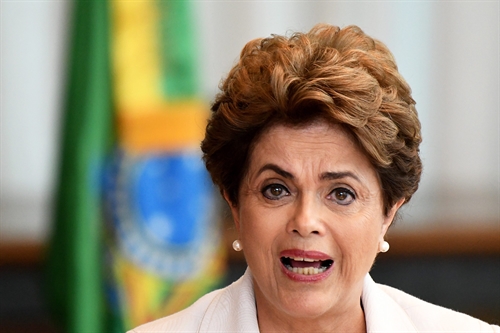 World
World

Brazil's suspended president Dilma Rousseff admitted on Tuesday she had made mistakes, but said she had done nothing worthy of impeachment in an address just over a week before she goes on trial.
 |
| Suspended Brazilian President Dilma Rousseff reads her letter to the Brazilian people and senators, during a press conference in Brasilia, Brazil, on Tuesday. Rousseff promised to immediately hold a new round of elections if the impeachment process against her is suspended. Rousseff, who was suspended from office on 12 May, is accused of various budget irregularities. - Photo EPA/VNA Photo |
BRASILIA — Brazil’s suspended president Dilma Rousseff admitted on Tuesday she had made mistakes, but said she had done nothing worthy of impeachment in an address just over a week before she goes on trial.
Rousseff, accused of using illegal budgetary maneuvers to cover up the depth of the country’s economic problems during her 2014 re-election, faces trial in the Senate starting on August 25, four days after the Olympic Games end in Rio.
With her impeachment trial looming, the Brazilian Federal Supreme Court also authorized on Tuesday the opening of an investigation into Rousseff and her predecessor Luiz Inacio Lula da Silva, for allegedly trying to obstruct a corruption probe into the state oil firm Petrobras.
In a letter to the Brazilian people that she read out in the capital Brasilia, Rousseff repeated her suggestion that Brazil hold new elections to get out of the political crisis.
Rousseff said that if she was spared by the Senate, she would back a referendum on holding early elections and electoral reform to carry out a "deep transformation" of a system that most Brazilians consider rotten.
She also struck a humble note.
"I have listened to the tough criticisms of my government, for the errors committed," she said.
"I accept these criticisms with humility and determination so that we can build a new way forward."
But Rousseff repeated her insistence that forcing her out through impeachment amounts to a coup.
"It would be an unequivocal coup, followed by an indirect election," she said.
"We have to strengthen democracy in our country, and for this it will be necessary for the Senate to close the impeachment process underway, recognising, given the irrefutable evidence, that there was no crime of responsibility.
"I am innocent," Rousseff insisted. "There is no injustice more devastating than to condemn an innocent person."
The final judgment phase in the impeachment process is expected to take several days before a vote.
The Senate must vote by a two-thirds majority at the end of the judgment session in order to remove her from office. If that happens, interim president Michel Temer would stay on until scheduled elections in 2018.
The Globo news organisation reported that the actual judgment vote will take place between August 30-31.
The president of the Supreme Court, Justice Ricardo Lewandowski, will preside.
Rousseff was elected in 2010, taking over from her political mentor Luiz Inacio Lula da Silva, founder of the leftist Workers’ Party.
She was re-elected in 2014 but her mandate rapidly got bogged down as economic output plummeted, unemployment rose and a huge corruption scandal tainted many of her allies, as well as members of the opposition.
Starting in 2015, her allies began to drift away. In May of this year, she was suspended to face impeachment proceedings.
"Brazil is living one of the most dramatic moments of its history," Rousseff wrote in her letter. — AFP